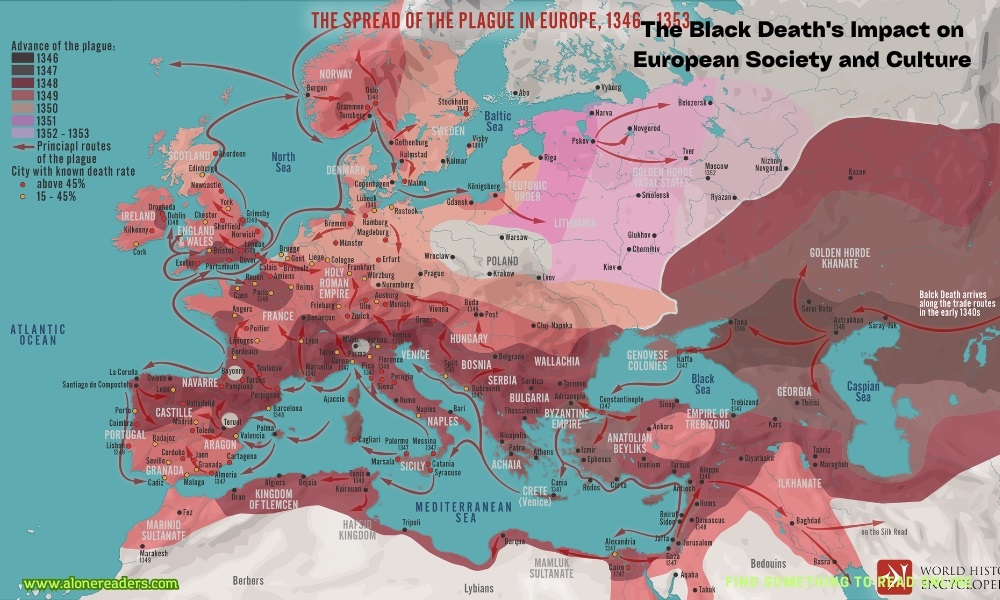
The Black Death, a devastating pandemic that swept through Europe from 1347 to 1351, is one of the most profound events in human history. It radically transformed European society, culture, and economy in ways that were both immediate and far-reaching. This article examines the various facets of these transformations, offering a comprehensive overview of how a crisis can redefine an entire continent.
The Black Death, caused by the bacterium Yersinia pestis, arrived in Europe in 1347, brought by ships from Asia to the Sicilian port of Messina. Within five years, it had claimed an estimated 25 to 50 million lives—approximately one-third of Europe's population at the time. This massive loss of life resulted in immediate and severe consequences for European society.
One of the most significant impacts of the Black Death was on Europe's social structure. With the death toll so high, labor became scarce, which shifted the balance of power from the landowning nobility to the working classes. Serfs and peasants, who had been bound to their masters’ land by feudal duty, suddenly found that they could demand wages for their work or move to new territories seeking better opportunities. This shift not only led to the decline of feudalism but also laid the groundwork for a more modern economic system based on wage labor.
The pandemic also prompted significant changes in the European economy. With the workforce drastically reduced, the cost of labor soared, leading to increased wages for the survivors. However, the general economy suffered as agricultural production declined, and trade faltered due to the decrease in available manpower and fear of contagion. This economic disruption caused a shift towards more localized economies, and in the long run, encouraged innovations in farming and mechanization, setting the stage for the Agricultural Revolution.
Culturally, the Black Death led to profound changes in Europe. The pervasive death and suffering shook people’s faith in the Church, which struggled to explain the catastrophe or provide relief from the suffering. This loss of faith spurred new religious movements, like the flagellants, and later contributed to the environment that fostered the Protestant Reformation. Moreover, the themes of death and mortality became common in art and literature, exemplified by the macabre dances of death—artistic representations that underscored the universality of death and the vanity of earthly pleasures.
The Black Death also had significant impacts on public health and urban planning. Before the pandemic, Europe’s cities were overcrowded and filthy, making them perfect breeding grounds for disease. The repeated outbreaks of the plague led to the establishment of public health measures, including quarantine laws, and the development of more planned urban spaces to improve sanitation.
Moreover, the demographic changes brought about by the Black Death had far-reaching implications for European society. The dramatic reduction in population led to large tracts of land becoming available, which altered land use patterns and contributed to shifts in social and economic structures. It also caused a significant genetic impact on the European population, as those who survived were likely to have had some form of genetic resistance to the disease.
Finally, the Black Death changed the course of European history by accelerating the decline of the Byzantine Empire and weakening the feudal lords in Europe, which helped to end serfdom in the West. The enormous psychological impact of the plague led to a collective reevaluation of life and mortality, profoundly influencing the Renaissance, a period marked by a renewed interest in humanism and the classical learning of the Greeks and Romans.
In conclusion, the Black Death was more than just a horrifying medical disaster; it was a pivotal event in European history that precipitated economic, social, and cultural transformations. These changes, although born out of tragedy, helped lay the foundations for modern Europe, influencing everything from the economy and the legal system to cultural and scientific advancements. Understanding the Black Death's impact helps to illustrate how deeply a pandemic can influence society, not just in immediate losses but in lasting legacies.